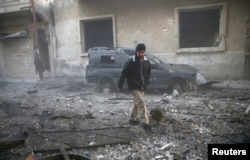The U.N. Syria envoy says he hopes to take advantage of a new momentum during the upcoming round of U.N.-led talks involving the al-Assad government and rebel representatives this week in Geneva.
Staffan de Mistura said the outcome of the conversation will essentially depend on the U.S. position.
“The big question mark is where is the U.S. in all this?" he asked during a forum at the Munich Security Conference in Germany.
World leaders, diplomats and defense officials have been meeting at the Munich Security Conference during the weekend.
Mistura said any political solution has to be inclusive to be credible to end the six-year conflict in Syria.
“We have to push for momentum. ... Even a cease-fire with two guarantors can’t hold too long if there is no political horizon,” he said referring to the truce mediated by Turkey and Russia in December.
While Mistura questioned U.S. President Donald Trump's engagement in solving the Syrian war, Brett McGurk, a State Department diplomat said “people will be disappointed” if they envision the U.S. abruptly choosing a new “tool in the toolkit.”
“I don't think the U.S. will come in with a one-size-fits-all solution, because there isn't one,” McGurk said.
Syrian National Coalition President Anas al-Abdah said the opposition is “fully committed and prepared to negotiate a political solution ... we have a glimmer of hope.''
McGurk said the Trump's administration is "re-looking at everything, which is a very healthy process from top to bottom."
"We will be very selfish about protecting and advancing our interests," he said.
Before Trump became president, the previous administration insisted President Bashar al-Assad had to leave power, a position contrary to what Russia believes as Moscow backs the Syrian leader.
Trump, however, has called for a more engaging cooperation with Russia to fight IS in Syria and Iraq, which leaves the Assad question open.
Anas al-Abdeh, head of the opposition National Coalition, said the question over Assad's future is a clear barrier for long-standing peace talks.
“As long as Assad remains in power," no solution can be found, he told at the Munich forum.
Previous efforts, which have involved indirect negotiations mediated by the U.N. envoy for Syria, resulted in little progress to resolve a war that began as peaceful protests against Assad before spiraling into a multi-party conflict.
Hundreds of thousands of people have died since March 2011, and according to the United Nations nearly five million people have fled the country while another six million are displaced within Syria.
Some material for this report came from AP, AFP and Reuters.






